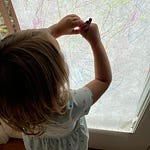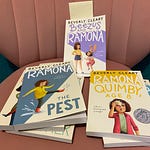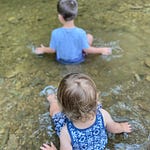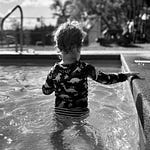Welcome to another post of Mindful Mom in the Mud. A newsletter focused on navigating the mess of parenthood with humor, compassion and common sense. Enjoy reading or listening with a hot beverage…or a reheated hot beverage.
You can check out the archive here for a variety of posts on mindfulness, navigating parenting advice, neurodiversity, and more.
I recently took a trip to my hometown of San Diego. It was an incredible privilege to grow up next to the ocean. And of course, totally underappreciated at the time. It wasn’t until I moved to the east coast and eventually far away from any waves, that I deeply appreciated it. Now when I find myself at the ocean, it makes an impression. It’s all the things—the size, the life within it, the beauty, its power, and the connection to nature. It is an experience of awe.
I posted a note on Substack about the experience after I returned, inquiring if anyone else had any recent experiences of awe.
author of Stuff Moms Google, replied:“I can’t think of something top of mind…which tells me I need to add some moments for awe.”
Ashley’s response feels about right. The truth is until my recent trip to the ocean, I couldn’t recall any either. Flying across the country is not a routine endeavor, so it felt like it was time to find awe more locally. It’s available every day if we are open to it.

Awe for all
I first encountered the academic concept of awe in graduate school, even though I certainly had encounters before that. It’s a simple concept with a lot of power.
The APA dictionary defines awe as:
“the experience of admiration and elevation in response to physical beauty, displays of exceptional ability, or moral goodness. The awe-inspiring stimulus is experienced as “vast” and difficult to comprehend.”
In Jonah Paquette’s book Awestruck: How Embracing Wonder Can Make You Happier, Healthier, and More Connected, he highlights that research has found that it is the unique combination of vastness with the need to accomodate, that qaulifies it as awe as opposed to other emotional states like amazement or wonder. And it can come in different packages. It may involve witnessing something physical like an eclipse or encountering something more conceptual like a new idea.
Awe has been around for a while, documented throughout history, especially within a religious context, but it wasn’t until recently that it was formally studied. And apparently, it’s good for you. There is a list of potential benefits but highlights are that it can promote connection, generosity, and curiosity. You can find more about the study of awe here and here.
Awe is for humans
When we study concepts like awe, sometimes something happens that is worth noting. And it goes a little like this—there is a phenomenon and we study it because we hypothesize it’s important in some way. We find some potential benefits and theorize that this phenomenon is indeed good. We design some things one can do that might support this phenomenon. And then we start to lose sight of the big picture. Something helpful and interesting becomes a thing to do to be better somehow. It becomes about doing more to be more, to be a happier or more productive person. This is one of the challenges of the self-help space. It may be time for a new genre—how about human-help?
So here’s the deal, awe has been around for a while. We can understand it to be a part of being human. And that tells us something about it having a positive role in the human experience. We live in a modern environment that makes it more difficult to experience awe, so finding ways to be open to it can be helpful. And that’s all that you can do, be open to it. Show up and see what happens.
Opening the door
To experience awe you have to notice it first. This is such an annoying directive. It’s annoying because we all know this, but it is still hard. We have a lot going on around and inside us at any given time and sometimes that can get in the way. So, step one is be intentional about noticing. And what if you don’t get to awe? You may get something else—like awareness, delight, gratitude, happiness, or laughter instead. Seems like it could still work out ok?
Hello awe
Acknowledging that I was needing some more awe around, I decided to tune in and write about what showed up. There are challenges when sharing personal experiences of awe. My words in hindsight probably don’t do it justice. For something that by definition is supposed to be difficult to understand, words make it seem simple and small, even if it was anything but. Also, my awe and your awe are not going to be the same. We all will have different experiences of what inspires awe but that is pretty awesome (ha, I had to do it somewhere). So here we go, some recent awe…
Chipmunks
I started to notice creatures were re-emerging with spring. I was so pleased to see the chipmunks. I hadn’t realized I had missed them so much. And with that, I started to think about how amazing hibernation is, which led to this deep appreciation of the changing seasons and how incredible it is that the earth has these rhythms. I was profoundly impressed by how nature works in this way.

Noodle Twirling
One night at dinner my toddler was determined to eat her spaghetti by twirling it on her fork. At some point, we may have shown this to her (this is our 4th kid, it’s all pretty blurry) but haven’t done much rigorous teaching/practice. It started with a moment of appreciation looking at what she is learning to do. Next, there was deep wonder at how we learn and how people naturally progress toward self-determination.
Contact Lenses
To refresh my knowledge of awe, I listened to the audiobook Awestruck: How Embracing Wonder Can Make You Happier, Healthier, and More Connected by Jonah Paquette. I happened to encounter this thought exercise one evening when I was taking my contact lenses out. Paquette encourages the reader to scan their environment and imagine they were visiting from 100 years ago, then 1000 years or 5,000 years. With the eyes of a time traveler, our modern world looks different. This exercise really does the magic of shining a different light on the mundane. I was in awe of my contact lenses for being the amazing tools that help me see every day. Yep, there was awe available in my bathroom.

The Ritual of Good Bye
And my final recognition of awe is an experience I found the words for when I started writing this piece. I had been to my hometown with the awe-inspiring ocean, to mourn a loved one. My family had gathered to go through the rituals of saying goodbye. I sat in the cemetery overwhelmed with the many emotions that are a part of grieving, but realizing how many other families had gathered together in this place before, to do the same seemed significant. It was a place full of memories of others. The experience of grief is universal and, in that moment, I felt so incredibly connected to many that I will never have the occasion to meet. And that was both vast and difficult to comprehend.

Another dose of awe
You can read more words on awe here from
in Big Awe can come in small packages:“What can you find awe for today? Not because you should or it’s good for you, but because you DESERVE to have this booster of well-being and connection. Because you deserve to feel more connected to the world around you and to yourself.”
The book on awe
Interested in learning more? You can check out Jonah Paquette’s book Awestruck: How Embracing Wonder Can Make You Happier, Healthier, and More Connected.















The Everyday Awe of Chipmunks